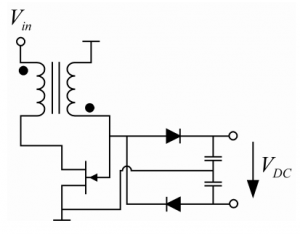Difference between revisions of "Ultra Low Power Conversion Circuit For Batteryless Applications"
From iis-projects
(Created page with "thumb|200px ==Short Description== Energy harvesting is generally seen to be the key to power cyber-physical systems in a low-cost, long ...") |
|||
| Line 1: | Line 1: | ||
| − | [[File:LowPower_DCDC_Converter.png|thumb| | + | [[File:LowPower_DCDC_Converter.png|thumb|300px]] |
==Short Description== | ==Short Description== | ||
| − | Energy harvesting is generally seen to be the key to power cyber-physical systems in a low-cost, long term, | + | Energy harvesting is generally seen to be the key to power cyber-physical systems in a low-cost, long term, efficient manner. However, harvesting has traditionally been coupled with large energy storage devices to mitigate the effects of the source's variability. The emerging class of transient, or batteryless, systems avoids this issue by performing computation only as a function of the harvested energy, minimizing the expensive and obtrusive storage element. One of the biggest challenges in batteryless system design is the cold start phase, where the harvesting circuit needs to self-start from 0V with the least amount of energy possible. |
While commercially available harvesters, based on boost-buck converters, can operate very efficiently in the >10 uW input power range, they are unable to operate in the nanowatt range. In this project, we want to design a DC-DC converter optimized for very low input power requirements, based on discrete components. | While commercially available harvesters, based on boost-buck converters, can operate very efficiently in the >10 uW input power range, they are unable to operate in the nanowatt range. In this project, we want to design a DC-DC converter optimized for very low input power requirements, based on discrete components. | ||
| Line 14: | Line 14: | ||
===Status: Available === | ===Status: Available === | ||
: Looking for 1-2 Master students | : Looking for 1-2 Master students | ||
| − | : Contact: [[:User:Gomeza | Andres Gomez]], Michele Magno | + | : Contact: [[:User:Gomeza | Andres Gomez]], [[:User:magnom|Michele Magno]] |
===Prerequisites=== | ===Prerequisites=== | ||
Revision as of 20:06, 9 August 2016
Contents
Short Description
Energy harvesting is generally seen to be the key to power cyber-physical systems in a low-cost, long term, efficient manner. However, harvesting has traditionally been coupled with large energy storage devices to mitigate the effects of the source's variability. The emerging class of transient, or batteryless, systems avoids this issue by performing computation only as a function of the harvested energy, minimizing the expensive and obtrusive storage element. One of the biggest challenges in batteryless system design is the cold start phase, where the harvesting circuit needs to self-start from 0V with the least amount of energy possible.
While commercially available harvesters, based on boost-buck converters, can operate very efficiently in the >10 uW input power range, they are unable to operate in the nanowatt range. In this project, we want to design a DC-DC converter optimized for very low input power requirements, based on discrete components.
Depending on the applicant's profile and project type, his tasks may involve some of the following:
- lab. testing/characterization of the initial prototype: measuring efficiency and minimum input power requirements
- printed circuit-board design.
Status: Available
- Looking for 1-2 Master students
- Contact: Andres Gomez, Michele Magno
Prerequisites
- You should have basic knowledge of electrical circuits and simulators.
- Knowledge about DC-DC converters would be an asset.
Character
- 20% Theory
- 50-60% Implementation
- 30-20% Testing
